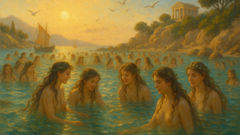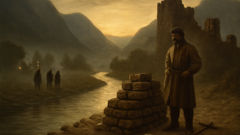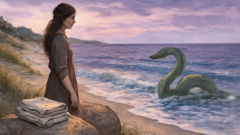Introduction
There are coasts where the sea keeps its own slow language, and when the wind bends the reeds in the salt marshes you can almost hear the rhythm of phrases long held by water. Along those ways—rock ledges warmed by sun, coves that cradle fishing boats, and harbors where the old stones still remember the footsteps of traders from distant islands—the Nereids swim. They are the fifty daughters of Nereus, the Old Man of the Sea, each named and known in local songs, each moved by the tides and the small rituals of seafarers. They are not monstrous or distant; they are neighborly as gulls and as deliberate as tide. A fisherman might find his net woven anew at dawn; a captain might wake to the ghostly glow of a lantern wrapped in kelp that points him away from hidden rocks; a grieving woman might feel a wave press a tiny shell into her palm as if the sea had offered a stone to remember someone by. This tale stitches together three meetings—at harbor, on a lonely southern promontory, and inside a storm—where men and women learn that the sea’s mercy is not fickle but braided from memory, song, and an exchange of respect. As you read, imagine the Mediterranean light: clear, hot, and generous; salt on your skin; the soft slap of oars; the way the horizon sits like a promise. In that light the Nereids are visible and invisible at once—fingertips of foam, eyes like deep wells, laughter that sounds at the keel of a ship. Let the story slow like a tide and remember that the sea remembers back.
Harbor Songs and Salt-Worn Knots
When the harbor bell struck dawn, the sheltered piers steamed with the breath of the sea and the last stars dissolved into day. Men worked with hands callused by rope and oar; women carried baskets of fish and herbs; children ran along the quay chasing ribbons left by sea-breezes. The helmsman, young Ioannis, had been awake all night, nursing worry in the way the old sailors call a bad cast of the luck. He had taken a vow to his father’s memory—an unspoken promise that the small fishing sloop would not leave the harbor without a blessing—and yet the map of the sea in his mind had jagged, uncertain edges. His father’s voice lived in patterns of rope and in the way he set a sail, but other things were absent: the steady hand on his shoulder, the exact cadence of a story at night. Ioannis walked the quay and listened for the harbor's ways to tell him if the day would be safe.
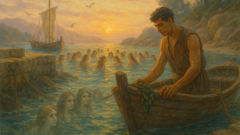
The Nereids were habitués of harbors. They liked the warm, shallow places where fishermen mended nets and children skipped stones, where the sea tasted of cooking fires and lemon. On an ordinary day they would comb through ropes, teasing out the knots sailors left unworried; in winter they would lay filaments of seaweed across broken planks so that the wood would not splinter further; in storms they would press a corridor of calmer water, pale as milk, to ease a vessel’s passage. They preferred small acts to grand miracles, for small acts are what make a life at sea possible: a replaced oarlock, a whisper of the proper reefing for wind. Ioannis would soon learn how precise and patient their help could be.
He found, as morning warmed, a single braid of kelp coiled upon the prow of his boat. It was neatly woven into a pattern his mother had once taught him to trust—double loops that meant safety, a single knot for remembrance. He did not know who braided it, but he also did not not know. When he reached to untie the kelp, a voice lifted from the water—thin as a reed but with an old steady tone.
“You do a poor job, mortal, of believing in favors,” the voice said. It came from the angle where the seawall met the quay: a part-surface world where foam pooled in lazy eddies. There, partly concealed, a face looked up—pale as a shell, hair threaded with the dim green of starved seaweed, eyes like small depths in which the harbor stones swam. Ioannis stepped back, half out of caution and half out of dazzlement.
“You are—” he began, then swallowed. He had heard the old songs at festivals, the rhymes mothers fed to children to make them pay heed to the water. He had also heard tales that the Nereids would send a shiver at the back of the neck if offended. When he bowed, it was awkward and sincere.
“A servant of Nereus,” the woman said, and a curl at her ear moved like a current. Around her in the water were others, glimpsed like quilts of light and shadow—silhouette arms that combed through the harbor weeds, hands that smoothed the surface of a puddle of oil so an old fisherman’s lantern would catch clean. They were not giants; they were not small wizened creatures. They were as varied as the sea itself: some lanky and quick, some round and slow, voices that threaded together like different instruments in a single song.
She introduced herself slowly—Nerina, whose fingers could remember the seams in a hull by touch; Melanthia, who could draw maps in the sand that remembered where reefs lay hidden; Thaleia, whose laugh sounded like a dozen small bells and who had a soft anger on behalf of gulls when nets were left in a bad way. Fifty names she recited as if them were embroidery: small syllables that belonged to coves and promontories. The Nereid who spoke to Ioannis wore a simple shell necklace and had a freckle like a grain of black sand at her collarbone. She did not demand a sacrifice, only that he listen.
“You cut the old lines too quick,” she said. “You are young, and quick hands become quick decisions. Sail and return; mend the nets with care. When a man rushes, the sea is left with a bitten surface.”
It might have been mockery, and it might have been gentle. Ioannis answered that his father had always said prudence was for old men. The Nereid’s expression—an ocean can make that line thin between scorn and compassion—softened. She ran a hand along the boat’s hull as if reading the story of its repairs: where it had been struck by a stony ridge two years before, where a previous owner had hammered in a clumsy patch. She hummed a note; the grain of the wood accepted it and settled. A small bolt loosened and popped into place as if an invisible hand tightened it. The net, heavy with last night’s catch, rearranged its knots into sturdier loops.
Ioannis stayed until the sun had climbed higher, watching a choreography he would later try to explain to others and fail. A child asked later if he had seen a mermaid; Ioannis corrected him—no mermaids, he said—these were older and less romanced by red lips and combs. The Nereids laughed softly at that, and one of them brought a scallop shell to the child, which when opened showed a tiny bead of mother-of-pearl polished like a promise. “Remember to leave something behind,” the Nereid told him, “a song or a clove of dried fig. The sea takes memory and returns care.”
Word spread slowly, as such things do; a boat saved from a hidden rock, a fisherman who found his nets easier to untangle, a child who swore he saw a woman walk across the top of the waves. Villagers began humbly leaving small offerings: a bit of bread, a scrap of olive oil, an old kerchief washed by hand. They sang short songs before launching: not grand hymns but small, stubborn threads of gratitude. The harbor prospered in a way that could be measured by the return of more boats and the easy laughter that began to hang in the market like bright laundry. Respect and reciprocity were not heavy laws; they were daily customs, and the Nereids were quick to respond when humans remembered them with ordinary courtesy.
Yet the sea is never entirely hospitable to every human heart. In the weeks that followed, Ioannis noticed sailors who came to the harbor and left the same day with no thought of the practice, who cut their lines and cursed the gulls. Some laughed at the offerings, some burned them as if in contempt. The Nereids are few in their capacity to change hard steel and harder hearts. They could mend a rope here, slide a lantern there, sing a lullaby for a child. What they did not do was force men to remember. Still, even their small kindnesses rippled outward; a rescued vessel creates less grief for a widow, a saved cargo keeps grain for the market, and where grain is abundant, people can afford time to spare on the sacred things that bind a shoreline together. In the harbor, the songs changed with the colors of the day, and the Nereids kept tally in ways that were not numbers but gestures: the added knot, the returned shell, the echoed tune.
When Ioannis finally set out with his father’s net and the morning sun at his back, he did so with a different sort of steadiness—the kind taught by tiny rituals repeated over seasons. He whispered to his boat the name his father had given it; he spat once for luck, and he made a small sign toward where Nerina had been, a private thanks. Out on the water he found the currents kinder than he expected, and when a seam in the hull strained a little, the place where the wood met the wave sighed and sealed. He smiled the way a man smiles when he has been watched over, and he knew then that friendship with the sea was not a single spectacle but a string of small, practical mercies. The harbor kept its own songs, and people learned to sing along.
By evening, though, the larger shapes of fate began to gather beyond the harbor’s teeth: rival captains whispered of shifting winds, and traders spoke of a storm that came up from the southern swell. The Nereids heard those rumors too and gathered where the shore bent and a lighthouse gave its single uncompromising beam. When you live by the sea, you live by the knowledge that mercy and danger are braided together; often it is the same hands—both human and nymph—that must untangle the two.
Promontories, Rituals, and the Widow’s Shell
Beyond the harbor, where the coastline rose into a sharp promontory, there was a stretch of shore strewn with old anchors and the bones of ships that forgot the way. Here, gulls nested on the cracked ledges, and thyme grew between the fissures. The promontory was a place for private prayers—an honest, rocky altar to small griefs. Therese, a widow in her third winter without her husband, came to that ledge each week, carrying with her a small leather pouch containing nothing grand: an old comb, a scrap of embroidered linen, and a handful of dry bread. She walked to the place where the sea could hear the rawest parts of a human voice, for people often speak truest where the horizon is honest and hard.
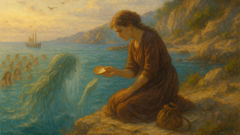
Therese had never believed in big miracles. She believed in tending a garden, in boiling a pot until the broth was rich, in making small bundles of herbs to ease a cough. After her husband’s boat did not come back from a trading run, she found that practical things were easier than overarching comfort. Yet the sea continued to keep a measure that people could not always read. She had been carrying her grief like a stone she feared would roll on and crush the village. On the promontory she set the leather pouch on a flat rock, untied it carefully as if unwrapping a small prayer, and arranged her offerings into a plain pattern: bread near the edge, comb on top, linen folded with care.
The Nereids enjoyed ritual because ritual asks for nothing grand and returns nothing extravagant: it is the conversation of daily life—an exchange of attention. They preferred small tokens that could be used later—a scrap of strong thread, a polished pebble used to weight a net. They noticed the quality of offerings: an olive pit pressed into the sand was different from an olive oil cup left to spill. Therese’s piety was quiet and exact. She spoke aloud as though marking each passing hour, reciting the names of birds her husband used to call neighbors. She did not ask the sea to give back the man she had lost. She asked for a sign that the world had not grown entirely indifferent.
That day, as Therese folded the linen, a Nereid named Phaessa slipped up behind the closest rock. Phaessa had long hair threaded with small beads of blue glass washed ashore from a merchant’s crate long ago; her fingers were deft with shells and rope, and she favored the company of those who tended nets with prayerful hands. When she saw Therese’s careful offerings, her curiosity bent toward compassion. She rose, not to take the offering but to lay a small shell on top of the linen: an olive-shaped shell, pale and perfect, smooth as if the sea had polished it itself. Therese turning to see it startled, for she had expected no one.
The shell was not an astonishing miracle. It would not bring back Therese’s husband or refill the boat’s spaces. But it contained a tiny, precise memory: etched inside, almost invisible, were lines that suggested a map—an anchor point and a shallow shelf where a seam of blue seaweed caught the sunlight differently. Phaessa did not speak at first. She watched Therese with the patience of water observing the shape of a stone. “We do not give back what was taken,” she said finally, “but we remember the presence of what has been gone. Keep the shell; put it where you will. When the wind comes hard, rest a hand upon it. You will not feel him, but you will feel the shore remember him with you.”
People in the village would later argue whether such memory mattered. Some said the shell was a trick of light; others said it was simply a good pebble. Therese herself, who had wiped tears in the folds of linen until the cloth resembled the ocean’s own wrinkled surface, kept the shell on her kitchen shelf. When she set it beside a bowl of figs, she would sometimes see the etched lines catch the late light and imagine tacking a small lantern to the boat’s stern. She began to visit the promontory not just to unburden herself but to leave small offerings for other losses she sensed around the bay: a coin for a sailor yet to be born, a carved toothpick for a house in need of a laugh.
The Nereids watched those small rituals and traded glances that resembled the break of waves—the kind of glance that carries much and says little. They had a keen eye for human sorrow because sorrow disturbs that which is steady: nets, jars, oaths. A grieving person leaves their clothes by the shore, slurps a boiled stew like a man pulling a rope, stamps a foot at the sky as if to remind the tide to return. The Nereids learned to respond in ways that did not erase the trouble but softened its ridges: a shell placed to help remember, a lullaby trailed in the air like a fisherman trailing his line.
There was a time when the village’s traders thought to quarry the promontory for stone to sell to a distant villa. The idea was briefly seen as a boon: money, employment, the chance for Therese's son to apprentice in masonry. Yet once the stonecutter had worked the first wedge, the sea around the promontory took on a different temper. Fish moved as if in disagreement; gulls abandoned their nests for a season. The Nereids gathered and sang, not loudly but with insistence. Hunters who were used to reading signs of the sea saw the water redden faintly at evening, as if tiny sea-flowers had been bruised. The villagers, who had not yet heard such a song from their neighbors under water, felt a churning in their bellies and in their livelihoods. The project was abandoned not because a deity struck them down but because the rock they had planned to shift contained an amphora grave where sailors of an older time had once been buried. The memory of those who had died at sea is not easily moved without consequence.
Therese kept her shell through that season. When the quarrying stopped, some people began to make small pilgrimages to the promontory. They left combs and small tokens, and if children asked why, elders said simply: 'Because the sea remembers.' For Therese, the shell became part of a quiet practice. She taught her neighbors and friends to tie a scrap of linen to a branch near the ledge so that the wind could carry their names outward, a soft flapping register of commemoration. Phaessa and the other Nereids would sometimes untie a scrap and braid it into ropes for small fishing lines, an exchange that turned sorrow into service.
It is easy to imagine the exchange as a single direction—from nymph to human—but the true story is braided. Humans give the sea attention and names; the sea returns favor and memory. Rituals are not payments but conversations, and the village learned that the geography of kindness required care. Therese’s grief did not vanish. Grief is stubborn as a tide. But where there is a place to put grief—an accepted rhythm of dishes washed and shells left on a shelf—the weight of sorrow becomes shared, and a widow can walk further without feeling as if a shadow pulls at her heels. Over many years, the promontory itself became a place that taught children the old songs. They learned the names of Nereids as if they were relatives: Phaessa of soft hands, Nerina who knew knots, Thaleia who laughed like bells. Whether they believed in the magic or not, they learned to leave the sea a scrap of courtesy, and in return the sea kept houses safe enough for daily life to continue.
And through all of this, the Nereids made sure to keep the small things—the net mended, a shell placed just so, a seam eased back into place. In the end the sea was neither judge nor arbitrary savior; it was a neighbor with its own memory and a capacity for kindness. Those who learned to listen to its small language found that it answered with small mercies, and sometimes, in the best weather, with a harmony that made even grief seem bearable.
Storms, Bargains, and the Merchant’s Reckoning
Storms are where the sea speaks the loudest—and often, the least forgivingly. They are the moments when promises are tested, when knots hold or snap, when the memory of the water becomes urgent and raw. Traders who saw only profit resented the sea for its unpredictability; older captains saw the sea as a teacher whose slaps were hard but instructive. Kimon, a merchant whose craft was leather and whose trade routes threaded the coasts like a careful seam, believed himself a practical man. He believed in ledgers and in the logic that money could pay for every inconvenience. When a hurricane came earlier than expected, he trusted his maps, the watch of his men, and the sturdiness of his hull. What he did not trust was the small etiquette the villagers practiced: he laughed at offerings left on the quay and burned a bit of oil in an impatient festival as a demonstration of his contempt for superstition.
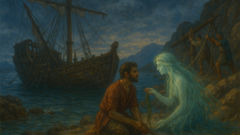
By mid-day the storm had found the gulf a rasp of wind and water. Waves began to fold like great hands over Kimon’s vessel; ropes sang under strain. His men, those who had been sailors since childhood, called for reefing and reefed with the speed of muscle memory. But in the chaos of it—a broken mast, a snapped tackle—something vital gave way. The mainmast cracked and fell, shattering in a rain of rigging and splintered wood. Kimon, who had always been practical in the abstract, now found himself face to face with very practical fear. The crew lashed what they could. Someone screamed that the current had shifted. The captain shouted orders. And through the wind, cutting like a blade, Kimon heard what could have been a voice but might have been only the sea: a chorus, layered and clear, moving through the spaces between the waves.
When the storm died away as quickly as it had arrived—a scouring and then a hush—the ship limped into the nearest cove with most of its crew alive but exhausted. Kimon’s ledger had lost far more than he thought; great jars of oil had cracked, bolts of cloth had been ruined, and the hull itself took on a wetness that did not look safe for travel. He could have been bitter—anger can be a steady companion when survival has been costly—but the face of suffering in his crew was immediate and humbling. Still, he refused to ask the sea for anything. Instead he busied himself with calculations: repairs, lost profit, the cost of sails.
The Nereids are sometimes misread as gentle because they are beautiful and because they prefer small acts, but they also honor binding agreements. They recognized a man like Kimon—capable, stubborn, and in need of humility. A Nereid of slower patience, Lysara, who favored bargains and pacts, surfaced near the stern in a way that made the crew jump. She offered him a deal as if offering a ledger rather than a miracle. “We can help you,” she said simply. “We can honor your ship with clean water corridors and hold your seams tight while your men repair the mast. In return, you must honor the coastal rites of a place you will trade with. This is not payment for rescue but a contract of mutual care. Promise us that you will not cut out the ledges of the bay for stone, that you will not burn away kelp beds, that you will give a portion of your cargo to towns that cannot buy, that you will teach your sons to stitch, not to scorn.”
Kimon, whose first thought was that of loss and survival, was asked to make a bargain that asked far less of him than what he felt was owed. He could have refused; he could have told her that agreements were signed in ink, not in salt and song. Instead, moved by fear and by the visible fatigue of his men whose hands trembled where clean work was required, he agreed with a raw sincerity. He promised to make small changes in how his trade touched the shore. Lysara, whose hands could braid currents and whose voice could tighten a rope to exactitude, sang a short note and a channel of calmer water opened like a flash of white glass. The crew repaired the mast and the hull with a speed that seemed to be aided by invisible hands. When the final bolt sunk home, Lysara slipped back beneath the surface, leaving a ribbon of green seaweed tied in the rudder as a mark of what had been exchanged.
Returning to port, Kimon began the slow and costly work of changing his routes and policies. He learned to leave anchors in the places old sailors hinted at to protect spawning fish, and when his ledger suffered, he learned the architecture of a different profit: steady trade with a healthy supply. He began to allocate a portion of his cargo to the poorest hamlets, whose gratitude turned them into loyal markets. He taught his sons to knot and to mend with patience rather than pay others to do it without care. Over seasons, the cost of this change balanced out with better crews and fewer sudden losses. Kimon’s name, once associated with cutthroat bargaining, came to mean careful commerce. He would later recount the bargain not as a dramatic pirate-shtick of myth but as a slow alteration of habit, the kind of character change that can save many lives.
Not all sailors who bargained with the Nereids kept their promises. Some made tidy pacts and then broke them, thinking the sea would not notice or that they could bribe the water with wealth. The consequences were not always immediate but found a way to arrive—fish stocks reduced, hidden shoals revealed at harvest time, cargo that rotted without reason. The Nereids’ economy is not a ledger of gold coin; it is an accounting of reciprocity. They balanced kindness with expectation. To understand their ethic is to see that stewardship is not a sentiment but a practice: care of the shoreline, careful fishing, leaving fragments of attention. Those who treated the ocean as merely a resource often found it less obliging.
There were also those, rare and generous, who treated the sea as a community partner. They held festivals for the Nereids every solstice, not to placate but to celebrate. They placed lanterns in the water to mark safe channels, and they taught their children songs that named each sister nereid. Some of the sisters took part in the festivals in small ways—arranging the kelp lanterns so they caught light, choosing a note in a chorus. These were not grand rituals to win favor; they were ways to embed the sea in the fabric of daily life. Kimon, once skeptical, would stand on the quay during one such festival and listen while a boatman chanted a list of names. He would trace the scar on his palm that had come from mending in the dark and smile knowing their business had become less precarious.
The storm that nearly took Kimon’s ship was a turning point in the village’s shared story. It taught them that commerce and care were not separate and that promises to the sea were not fanciful superstitions but a form of practical ethics. The Nereids remained as they had always been—unflashy in most of their help, meticulous in their memory, and capable of participating in the slow work of changing human custom. For those who chose to listen, the sea offered lanes of mercy; for those who turned their backs, the sea placed obstacles like natural punctuation. In the end, Kimon’s reckoning was not merely that his cargo lists had been altered but that his life had been rearranged into a pattern that made space for the sea’s memory. He found a kind of profit that could not always be counted, but which steadied his hands for years enough that his heirs had fewer days of fight and more of steady work.
Storms, bargains, and reckonings: the Nereids’ domain is full of these acts where the small and the large intersect. The sea keeps a ledger written in currents and shells; those who understand its handwriting learn to live within its rules, and those who ignore it find themselves adrift in more ways than one.
Conclusion
The sea remembers in ways that are neither purely benevolent nor purely punitive; it keeps histories of care and forgetfulness in braided currents and in the memory of shells. The Nereids, fifty daughters of Nereus, are less an army of miracle-workers than a neighborhood of neighbors: they mend and sing, they remind and bargain, and they return the smallest courtesies with precise and practical grace. The village learned to shape its rituals not out of fear but out of the modest logic that a landscape of kindness endures. Children grew up knowing not only the names of their parents but the names of the sisters under the waves. Sailors taught their sons to knot with reverence. Merchants altered ledgers in ways that balanced commerce with stewardship. Widows kept shells on their shelves as small registers of memory. And when a storm rose to swallow a mast, the Nereids were there in the in-between—signaling safe passage, softening a seam, offering a bargain that grounded a man who might otherwise have been lost. These are not grand miracles of thunderous conversion; they are, instead, the steady adjustments that keep a shoreline functioning: mended nets, lanterns that mark rocks, shells placed to remember. If you listen to the Mediterranean at dawn, you can almost hear how it catalogues every courtesy and every slight. The sea responds to those who remember it, and the Nereids answer with a form of attention that is at once fierce and ordinary. When you leave a scrap of bread at the water’s edge, tie a ribbon to the promontory’s scrub, or teach a child to stitch a net properly, you are not merely performing ritual—you are entering into a system of care that another kind, the kind of the sea itself, will honor in its ways. That is the old and true lesson the Nereids teach: we belong to a world of mutual tending, and the simplest acts of attention accumulate into the broad mercy that keeps sailors alive, kitchens full, and the coastline singing its long, patient songs.

